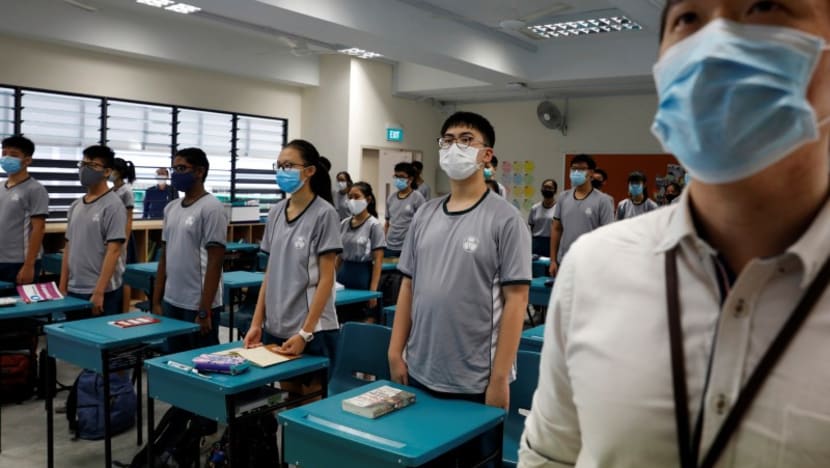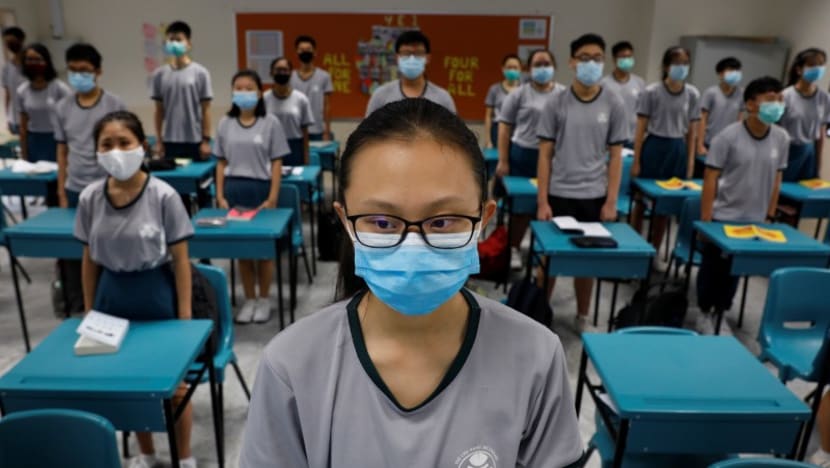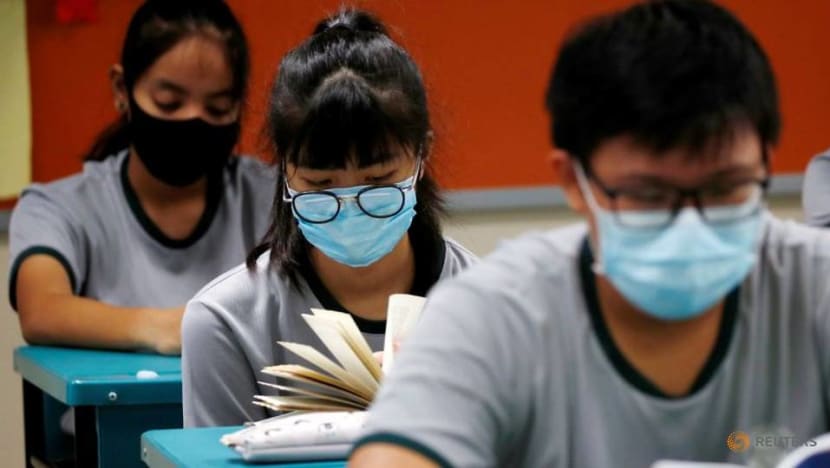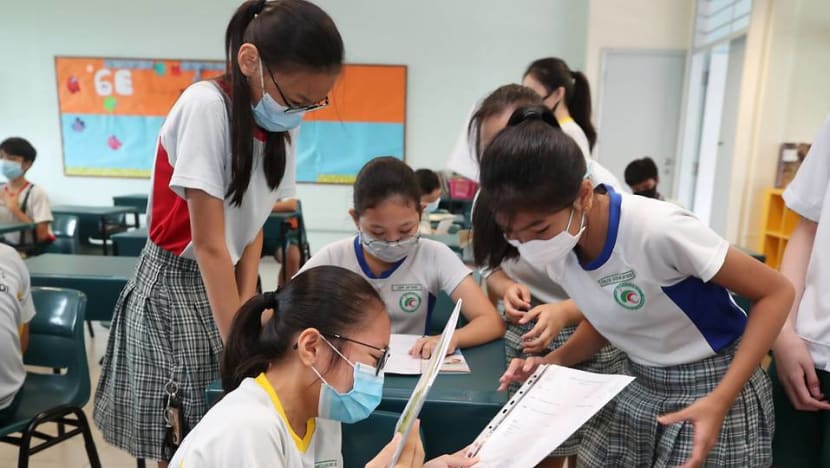commentary Commentary
Commentary: After the craziest year, teachers start first day of school with nervous apprehension
Yet teachers have been the true heroes of our education system taking on more responsibilities and staring down big COVID-19 challenges, says Jason Tan

Students wearing face masks sing the national anthem in class at Yio Chu Kang Secondary School, as schools reopen amid the coronavirus disease (COVID-19) outbreak in Singapore June 2, 2020. REUTERS/Edgar Su
SINGAPORE: Monday (Jan 4) marks the start of a new school year – at least for Primary 1 and Kindergarten 1 kids.
With a new school environment and fresh faces, most students no doubt feel some level of excitement, even nervousness, and so will their parents, seeing now how only one guardian can accompany the child.
Months of logistical and emotional preparations have been invested leading up to this day to soothe concerns.
But here’s some food for thought for anxious faces gearing up for today’s big milestone: In the wake of a coronavirus-plagued year, it is not only students and parents who are looking forward to the new school year in 2021 with a mixture of excitement and apprehension.
Teachers too are anxious.
READ: Commentary: Teachers now have new jobs. Schools will never be normal again after COVID-19
EXCITEMENT AND SATISFACTION
Don’t get me wrong. The first day of school is seen by many educators as a wonderful chance to greet a new class and put them on a strong footing for a year-long journey of discovery and learning.
While many teachers might shepherd their old classes from the previous years, each new school year brings with it a few new classes and up to 100 or more fresh faces in my experience.
Teachers feel that excitement as they look forward to unwrapping each student’s unique personality and figuring out how best to help each of them learn and grow, not only through the academic curriculum, but also through other school experiences such as co-curricular activities.
READ: ‘Definitely a loss' when students miss out on in-person CCAs, but COVID-19 could bring opportunities: Experts

But in addition to getting to know individual students, teachers also have to develop an awareness of the class dynamics, for instance, how students interact together and oversee those exchanges with care.
So understandably, along with the excitement, educators feel a certain degree of nervous apprehension.
A YEAR OF ZOOM SCHOOL AND BIG CHALLENGES
Let’s not forget teachers too have just undergone the craziest year in their educational careers that upended educational pedagogy. The COVID-19 crisis that erupted in 2020 brought about tremendous tumult in Singapore schools.
Not only were classroom teaching and learning activities forced to go online for a while, co-curricular activities were suspended for a few months before being progressively and only partially allowed to resume.
The crisis also had consequences for school examinations. The Ministry of Education announced the cancellation of all mid-year examinations while the Singapore Examinations and Assessment Board announced reductions in the content coverage for the key national examinations such as the Primary School Leaving Examination.
Meanwhile, the suspension of face-to-face lessons brought into stark focus social and educational inequalities.
Thankfully, the Education Ministry offered to supply personal learning devices and took steps to ensure the continuation of the School Meals Programme for students in need of such assistance.
READ: Commentary: Laptops for every student – a lot could go wrong
READ: Commentary: The case for universal digital access, as home-based computing becomes a post-pandemic norm
At the same time, teachers had to instruct students on various safe management measures in order to guard students’ physical health, while also keeping a watchful eye out for possible mental health issues.
NEW DEMANDS SET TO CONTINUE
The demands placed on teachers in 2020 are likely to continue. For instance, teachers will have to figure out how to hold the National School Games and ready their students for the Singapore Youth Festival Arts presentation, both of which are on track to restart in 2021.

Teachers also have the challenge of interpreting Ministry of Education policy announcements like plans to make blended learning a regular feature of the school curriculum, and translating them in meaningful ways within their individual practice.
Besides this, teachers will have to implement the Character and Citizenship Education 2021 curriculum, which focuses, among other things, on the strengthening of mental health and cyber-wellness education and the establishment of peer support structures within every school.
Other priority areas include enhanced support for students with special educational needs and after-school provisions for disadvantaged students.
READ: Commentary: Home-based learning is strange, new ground. But we can conquer that too
Teachers also have the onerous responsibility of responding to emergent societal concerns such as the protection of students from online predators and the promotion of gender education and respect.
The good news is new opportunities are also availed to teachers hoping to find support to cope with these challenges.
The Ministry of Education introduced the SkillsFuture for Educators, an enhanced professional development roadmap, at the Committee of Supply Parliamentary debates in March 2020.
Teachers will have the chance to improve their skills and competencies in areas such as inquiry-based learning and e-pedagogy in order better to prepare for the evolving priorities in the school system.

FRESH AREAS OF CONCERN
People often think teachers naturally have confidence and are endowed with strong public speaking skills, and do not realise how teachers are invariably concerned about how well their students will respond to both their teaching and to them as individuals.
This concern does not diminish with increasing experience as previous successes do not automatically guarantee success with subsequent students.
There is also the prospect of responding to the unknown, for instance, in finding out about crises that occur in students’ lives and responding in a responsible and caring manner.
In recent years, the apprehension that teachers feel has been increased by the knowledge that students’ lives are in some ways substantially different from those that teachers themselves experienced when they were of school age.
For instance, present-day students are for the most part digital natives, and teachers therefore have to take this phenomenon into consideration when planning their teaching and learning activities, while being aware of the possible cyber-threats their students face.
Listen to two parents share their front-row experience to their kids' educational journey of home-based learning during the circuit breaker on CNA's Heart of the Matter podcast:
In addition, teachers have to help their students navigate a more diversified school landscape than that they went through.
There are also concerns over the world into which their students will emerge as adults. How do teachers prepare their students to be lifelong learners in anticipation of a future widely believed to be volatile and unpredictable, and for a workplace in which skills will increasingly count for more than qualifications?
THAT RELATIONSHIP WITH PARENTS
Yet another key group of stakeholders that teachers will have to work with in 2021 are their students’ parents.
While parents are naturally focused on their children’s learning and growth, teachers have to deal not only with individual students but also with the collective welfare of students, whether in or out of the classroom.
Teachers have the task of communicating clearly to parents the rationale for various school practices, especially in light of the fact that, like the teachers, the parents too are grappling with the realities of numerous policy changes.
READ: Commentary: PSLE scores and the problem with the beloved late bloomer narrative
READ: Commentary: PSLE scores could impact life outcomes. So don’t let them
In other words, teachers are a mediating bridge between parents and the Ministry of Education.
For example, parents of non-special needs students may need to understand how the mainstreaming of students will special educational needs will benefit their children in terms of developing values such as care and respect, rather than thinking that the special educational needs students will slow down their children’s progress.
Furthermore, teachers have the heavy responsibility of enlisting support from, and forming collaborative partnerships with, a wide diversity of parents that range from the over-anxious to the uninvolved.

As teachers head back to school in 2021, their excitement is probably coupled with some trepidation as well. The uncertainties that emerged in the year 2020 offered them an excellent opportunity to grapple with different roles such as health care worker and online educator. They also tested teachers’ resilience and adaptability.
Their responses to these challenges will serve them well as they continue with the task of contributing to their students’ holistic development and that of working hand-in-hand with their students’ parents.
Above all, we are reminded that education is at its very heart, an extremely human undertaking, and is not only about challenges but also about opportunities to help each student in his or her own learning journey.
Listen to three working adults reveal how their PSLE results have shaped their life journeys in a no-holds barred conversation on CNA's Heart of the Matter podcast:
Jason Tan is an associate professor at the National Institute of Education.














